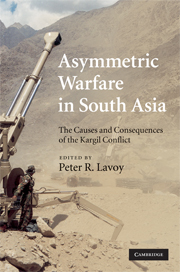Book contents
- Frontmatter
- Contents
- List of maps and tables
- List of contributors
- Preface
- List of abbreviations and acronyms
- 1 Introduction: the importance of the Kargil conflict
- Part 1 Causes and conduct of the conflict
- 2 The strategic context of the Kargil conflict: a Pakistani perspective
- 3 Pakistan's motivations and calculations for the Kargil conflict
- 4 Military operations in the Kargil conflict
- 5 American diplomacy and the 1999 Kargil Summit at Blair House
- 6 Kargil: the nuclear dimension
- 7 Why Kargil did not produce general war: the crisis-management strategies of Pakistan, India, and the United States
- Part 2 Consequences and impact of the conflict
- Part 3 Lessons learned
- Index
5 - American diplomacy and the 1999 Kargil Summit at Blair House
from Part 1 - Causes and conduct of the conflict
Published online by Cambridge University Press: 30 March 2010
- Frontmatter
- Contents
- List of maps and tables
- List of contributors
- Preface
- List of abbreviations and acronyms
- 1 Introduction: the importance of the Kargil conflict
- Part 1 Causes and conduct of the conflict
- 2 The strategic context of the Kargil conflict: a Pakistani perspective
- 3 Pakistan's motivations and calculations for the Kargil conflict
- 4 Military operations in the Kargil conflict
- 5 American diplomacy and the 1999 Kargil Summit at Blair House
- 6 Kargil: the nuclear dimension
- 7 Why Kargil did not produce general war: the crisis-management strategies of Pakistan, India, and the United States
- Part 2 Consequences and impact of the conflict
- Part 3 Lessons learned
- Index
Summary
Prologue
From the day the Center for the Advanced Study of India published this essay on the Kargil crisis and President's Clinton meeting with Prime Minister Sharif at Blair House it received a lot of attention. The Washington Post and The Times (London) both featured the essay on their front page. Since then dozens of Indians and Pakistanis have looked me up to discuss the piece and give their own opinions or memories of the crisis. Several Pakistanis involved in the Blair House meeting have thanked me privately for getting out an in-depth account of what happened that day. President Clinton wrote me a handwritten note later in 2002 expressing his appreciation for putting together the account.
In the years since 2002 other participants on the American side have provided their own accounts of that day. The president briefly refers to it in his memoirs, My Life, highlighting his deep concerns about Osama bin Laden and the lack of Pakistani cooperation in bringing him to justice before he could attack America. Deputy Secretary of State Strobe Talbott relates the events of 4 July 1999 in considerable detail in the context of his effort to persuade India and Pakistan to control their nuclear arms race after their twin tests in 1998. Strobe's version of events is entirely consistent with mine including with regard to the disturbing reports we received about Pakistan's nuclear activity.
- Type
- Chapter
- Information
- Asymmetric Warfare in South AsiaThe Causes and Consequences of the Kargil Conflict, pp. 130 - 143Publisher: Cambridge University PressPrint publication year: 2009



